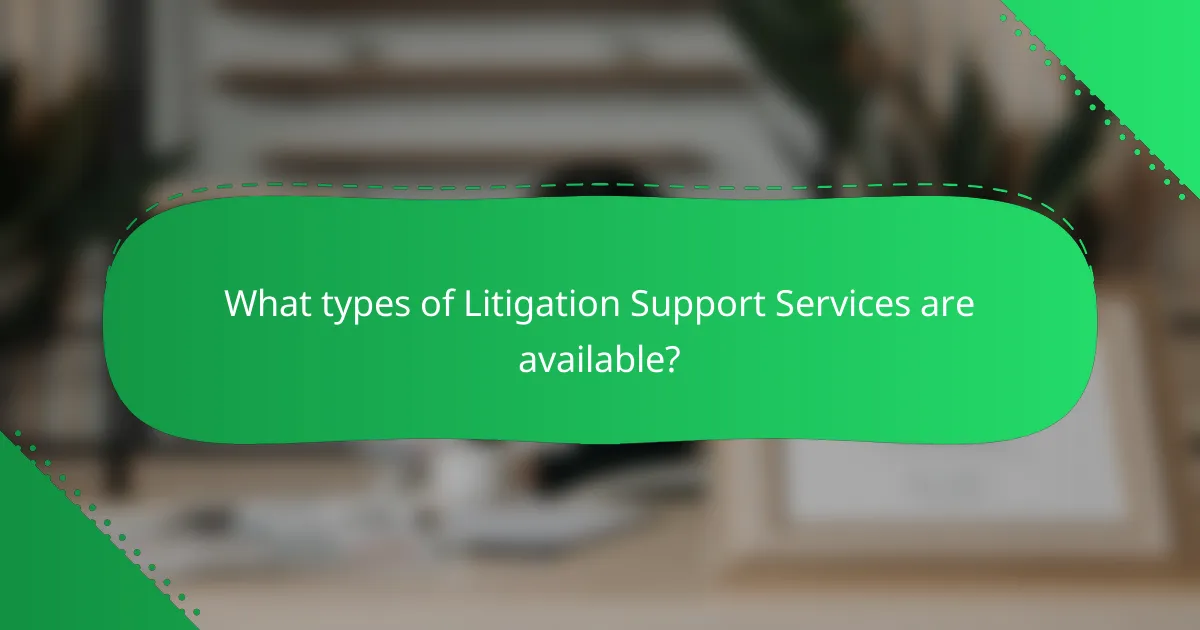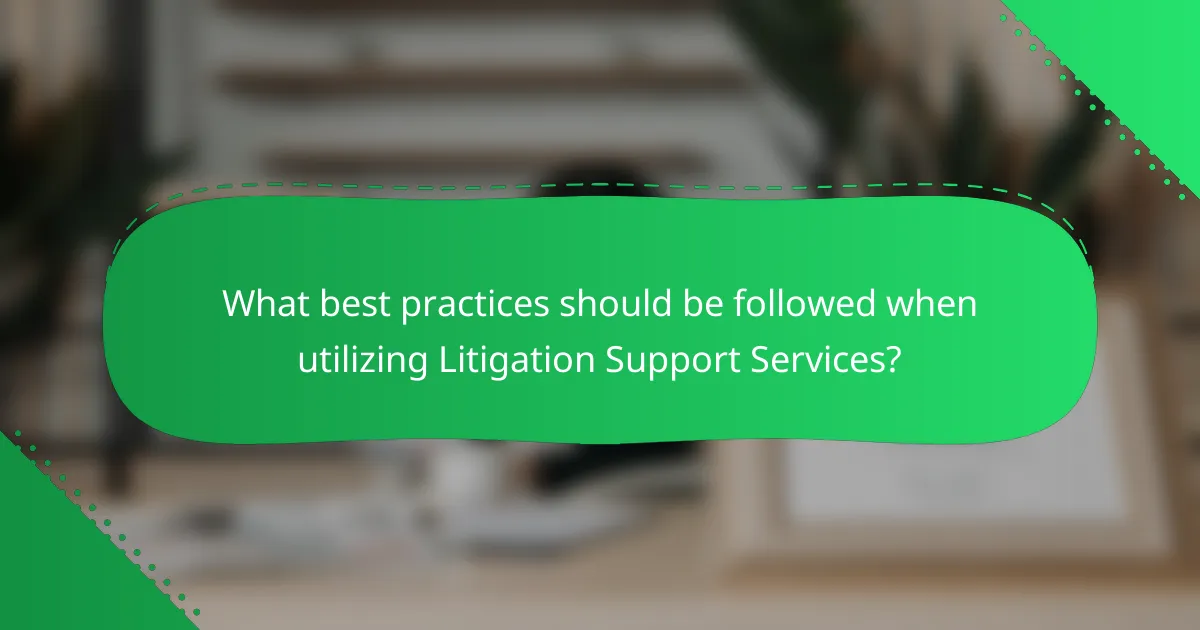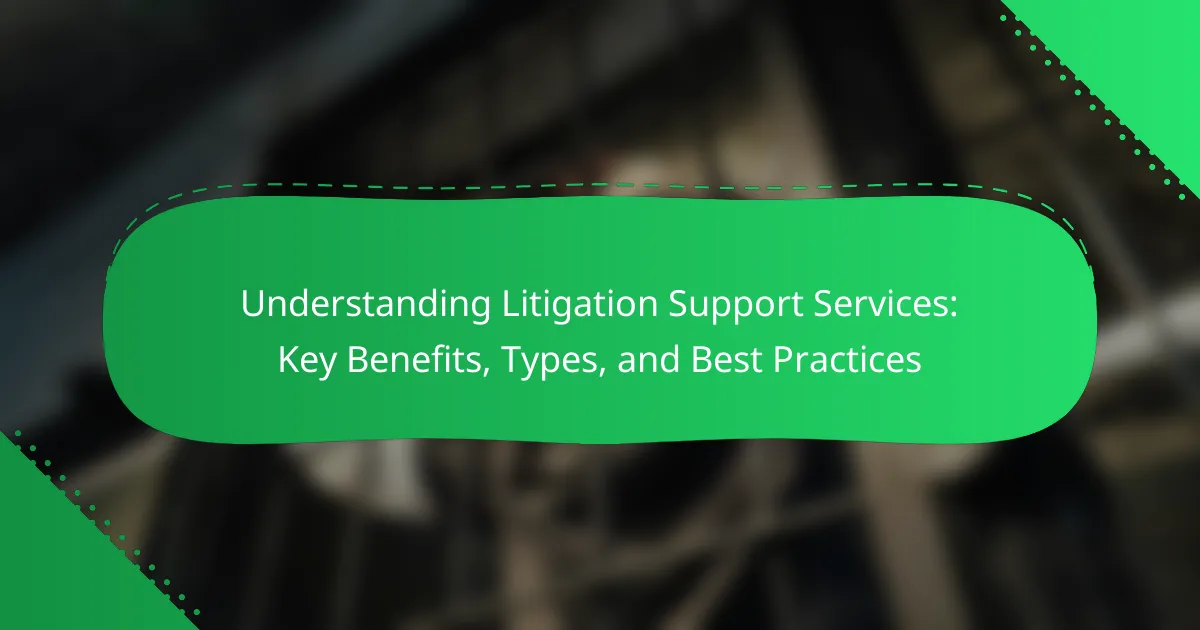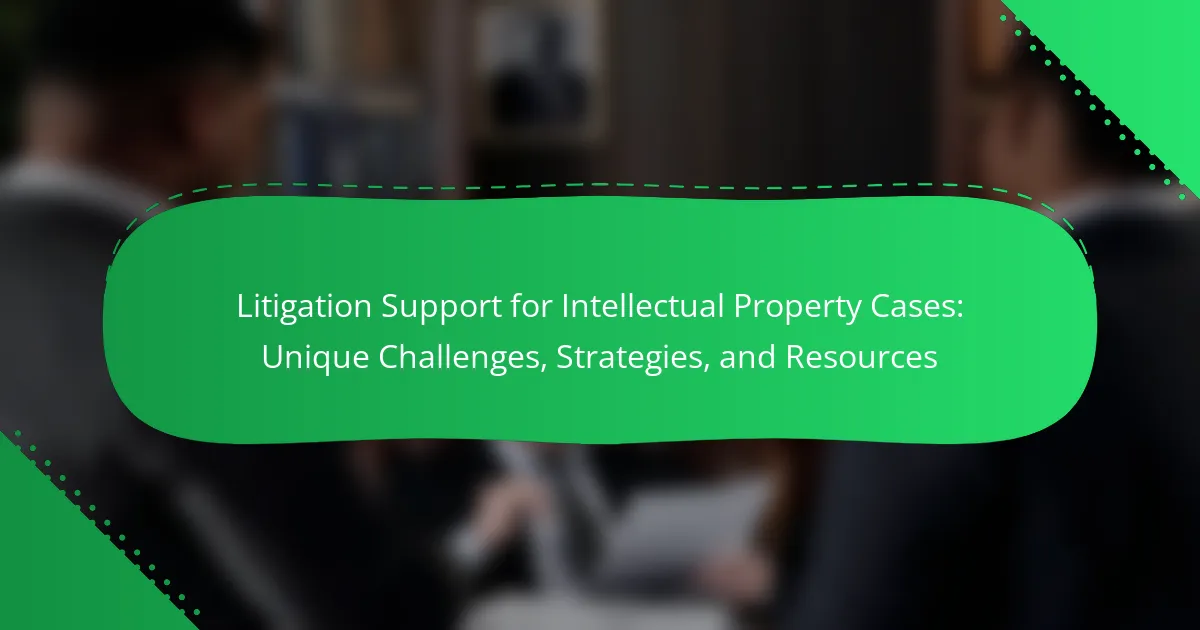Litigation support services are specialized professional services designed to assist legal teams throughout the litigation process. These services include document management, electronic discovery, expert witness consulting, and trial preparation, all aimed at streamlining legal proceedings and improving case outcomes. The article outlines the various types of litigation support services, their key benefits, and best practices for effective utilization. By adhering to these practices, legal professionals can enhance efficiency, manage evidence effectively, and ensure successful litigation results.

What are Litigation Support Services?
Litigation support services are professional services that assist legal teams during litigation. These services include document management, electronic discovery, and trial preparation. They help streamline the litigation process and improve case outcomes. Litigation support services also provide expert witness consulting and forensic analysis. Many law firms rely on these services to manage large volumes of evidence. For instance, electronic discovery can reduce costs and time associated with gathering and reviewing documents. Overall, these services enhance the efficiency and effectiveness of legal proceedings.
How do Litigation Support Services function in the legal process?
Litigation Support Services function by providing essential assistance to legal teams throughout the litigation process. These services encompass various tasks, including document management, data analysis, and trial preparation. They help attorneys organize and review large volumes of evidence efficiently. Litigation support professionals utilize technology to streamline the discovery process. This technology includes e-discovery tools that facilitate the identification and collection of relevant documents. Additionally, they assist in creating visual aids for presentations during trials. Their expertise enhances the overall effectiveness of legal strategies. Studies show that effective litigation support can significantly reduce trial preparation time and costs.
What are the key roles of Litigation Support Services?
Litigation Support Services play a crucial role in the legal process. They assist legal teams in managing and organizing case-related information. These services include electronic discovery, document management, and data analysis. They also provide expert testimony and trial presentation support. Litigation Support Services help streamline workflows and improve efficiency. They ensure compliance with legal protocols and deadlines. Their contributions can significantly impact case outcomes. The use of technology in these services enhances accuracy and reduces costs.
How do these services interact with legal professionals?
Litigation support services interact with legal professionals by providing essential resources and expertise. These services assist in managing case documents, organizing evidence, and conducting legal research. Legal professionals rely on litigation support for technology solutions, such as e-discovery tools. These tools streamline the review and analysis of large volumes of data. Additionally, litigation support services offer expert testimony and consulting in specialized areas. This collaboration enhances the legal team’s efficiency and effectiveness in preparing for trial. According to the American Bar Association, 75% of attorneys use litigation support services to improve case outcomes.
What are the primary benefits of using Litigation Support Services?
Litigation Support Services provide essential assistance in legal cases. They enhance case management efficiency. These services improve the organization of documents and evidence. They facilitate better communication among legal teams. Litigation Support Services also offer expert analysis of complex data. They can significantly reduce the time required for trial preparation. Additionally, they help in the identification of critical evidence. This leads to more informed legal strategies.
How do Litigation Support Services enhance case preparation?
Litigation Support Services enhance case preparation by providing critical resources and expertise. They streamline document management and organization, ensuring that relevant materials are easily accessible. These services include e-discovery, which helps identify, collect, and analyze electronic evidence efficiently.
Litigation support also offers data analysis, enabling attorneys to uncover patterns and insights from large volumes of information. Additionally, they assist in trial preparation by creating visual aids and exhibits that clarify complex information for juries.
According to a report by the Association of Litigation Support Professionals, effective use of litigation support can reduce case preparation time by up to 30%. This efficiency allows legal teams to focus on strategy and advocacy rather than administrative tasks.
What cost-saving advantages do Litigation Support Services provide?
Litigation Support Services provide significant cost-saving advantages by streamlining legal processes. They reduce the time attorneys spend on case preparation. This efficiency leads to lower billable hours. Additionally, these services minimize the need for in-house resources. Outsourcing tasks like document review can be more economical. They also utilize technology to automate repetitive tasks. This further decreases labor costs and increases accuracy. According to a study by the American Bar Association, firms that implement litigation support report cost reductions of up to 30%.

What types of Litigation Support Services are available?
Litigation support services encompass various specialized services that assist legal professionals in managing cases. These services include document management, which organizes and stores case-related documents efficiently. E-discovery services help in identifying, collecting, and reviewing electronic data relevant to litigation. Expert witness services provide access to specialists who can testify in court to support a case. Trial consulting services offer strategic advice for trial preparation, including jury selection and trial presentation. Additionally, legal research services assist attorneys in finding relevant case law and statutes. Each type of service plays a crucial role in enhancing the effectiveness and efficiency of legal proceedings.
What are the main categories of Litigation Support Services?
The main categories of Litigation Support Services include document management, e-discovery, trial preparation, and expert witness services. Document management involves organizing and maintaining legal documents efficiently. E-discovery encompasses the identification, collection, and review of electronically stored information. Trial preparation focuses on creating trial materials and strategies to support legal arguments. Expert witness services provide specialized knowledge to assist in legal cases. Each category plays a crucial role in enhancing the effectiveness of legal proceedings.
How does electronic discovery fit into Litigation Support Services?
Electronic discovery is a crucial component of Litigation Support Services. It involves the identification, collection, and analysis of electronically stored information (ESI) relevant to legal cases. This process aids legal teams in efficiently managing large volumes of data. Electronic discovery streamlines the review process, reducing time and costs associated with traditional discovery methods. According to the 2021 Legal Technology Survey Report, 97% of law firms use some form of electronic discovery. This highlights its importance in modern litigation practices. By integrating electronic discovery, Litigation Support Services enhance overall case management and improve outcomes for clients.
What role does trial consulting play in Litigation Support Services?
Trial consulting plays a critical role in Litigation Support Services. Trial consultants assist legal teams in preparing for trial by providing strategic insights. They analyze case materials to identify strengths and weaknesses. Consultants also help develop persuasive narratives for presenting evidence. They may conduct mock trials to gauge jury reactions. This process helps refine trial strategies based on feedback. Furthermore, trial consultants offer expertise in jury selection and witness preparation. Their contributions aim to enhance the chances of a favorable verdict.
How can specialized Litigation Support Services benefit different legal cases?
Specialized Litigation Support Services enhance the efficiency and effectiveness of legal cases. They provide essential resources such as document management, e-discovery, and trial preparation. These services streamline information retrieval, reducing time spent on case preparation. They also offer expert analysis and consulting, which can strengthen legal arguments. In complex cases, these services help manage large volumes of data, ensuring critical information is accessible. Additionally, they improve collaboration among legal teams by facilitating communication and organization. According to the American Bar Association, effective litigation support can significantly impact case outcomes by ensuring thorough preparation and strategic planning.
What unique needs do complex litigation cases have?
Complex litigation cases have unique needs that require specialized attention and resources. These cases often involve multiple parties and extensive documentation. They may require advanced case management tools to track progress and deadlines. Additionally, complex litigation often necessitates expert witnesses to provide testimony on specialized subjects. Coordination among various legal teams is crucial to ensure consistency and strategy alignment. High volumes of data may need to be analyzed and presented clearly. Furthermore, these cases typically require robust financial resources to cover extensive legal fees and litigation costs. Effective communication strategies are essential to manage client expectations and keep all stakeholders informed.
How do Litigation Support Services cater to specific industries?
Litigation Support Services cater to specific industries by providing tailored solutions that meet unique legal needs. For example, in the healthcare sector, these services assist with medical records management and compliance issues. In the construction industry, they focus on contract disputes and project documentation. Financial services benefit from data analysis and forensic accounting. Each industry requires specialized knowledge and tools to address its challenges. Litigation support professionals often have expertise in these fields, ensuring effective support. This targeted approach enhances the efficiency and success of legal proceedings across various sectors.

What best practices should be followed when utilizing Litigation Support Services?
Utilizing Litigation Support Services effectively requires adherence to several best practices. First, clearly define the scope of services needed. This ensures that the support aligns with case requirements. Next, maintain open communication with the litigation support team. Regular updates facilitate collaboration and address issues promptly.
Additionally, ensure all data is organized and accessible. Proper documentation streamlines the process and enhances efficiency. It is also vital to stay updated on the latest technology and tools in litigation support. Leveraging advanced software can improve data management and analysis.
Finally, establish a timeline for deliverables. This helps manage expectations and keeps the case on track. Following these best practices can lead to a more successful litigation process.
How can legal teams effectively integrate Litigation Support Services?
Legal teams can effectively integrate Litigation Support Services by establishing clear communication and collaboration channels. This involves defining roles and responsibilities for team members. Additionally, legal teams should utilize technology solutions that streamline document management and case analysis. Implementing project management tools can enhance workflow efficiency. Regular training sessions on litigation support tools can ensure all team members are proficient. Furthermore, aligning litigation support services with case strategies can improve overall effectiveness. Research from the American Bar Association indicates that effective integration can lead to reduced case preparation time by up to 30%.
What strategies enhance collaboration between lawyers and support services?
Effective strategies for enhancing collaboration between lawyers and support services include establishing clear communication channels. Regular meetings and updates foster transparency and alignment on case objectives. Utilizing collaborative technology tools can streamline document sharing and task management. Defining roles and responsibilities helps prevent overlaps and confusion. Training sessions on litigation support tools can enhance mutual understanding of capabilities. Encouraging feedback fosters continuous improvement in collaboration processes. Building strong interpersonal relationships enhances trust and cooperation. These strategies are proven to improve efficiency and outcomes in legal cases.
How can technology improve the efficiency of Litigation Support Services?
Technology can significantly improve the efficiency of Litigation Support Services. It automates repetitive tasks, reducing manual labor and errors. Software solutions streamline document management and retrieval processes. Advanced analytics tools enhance data analysis and case strategy development. Cloud-based platforms facilitate real-time collaboration among legal teams. E-discovery tools expedite the identification and review of relevant documents. Artificial intelligence can predict case outcomes based on historical data. These technological advancements lead to faster case resolution and lower operational costs.
What common challenges should be addressed when using Litigation Support Services?
Common challenges when using Litigation Support Services include data management issues, communication barriers, and cost concerns. Data management can be complex due to the volume and variety of information involved in cases. Effective organization and retrieval of documents are critical for case success. Communication barriers may arise between legal teams and support providers, leading to misunderstandings. Clear communication protocols are essential to ensure alignment on objectives. Cost concerns often surface as litigation support can be expensive. Budgeting and cost management strategies are necessary to mitigate financial risks. Additionally, technology integration can pose challenges, as not all firms may be familiar with the tools used in litigation support. Training and support are vital for seamless technology adoption.
How can legal teams mitigate risks associated with Litigation Support Services?
Legal teams can mitigate risks associated with Litigation Support Services by implementing thorough vendor assessments. This involves evaluating the qualifications and reliability of service providers. Establishing clear communication protocols is essential. It ensures that all parties understand expectations and requirements. Regular training for team members on technology and processes is also crucial. This helps in minimizing errors during data management and analysis. Additionally, maintaining robust data security measures protects sensitive information from breaches. Conducting periodic audits of litigation support processes identifies potential risks early. Finally, creating a contingency plan prepares the team for unforeseen challenges. These strategies collectively reduce the risks inherent in litigation support.
What are the best ways to ensure quality and accuracy in Litigation Support Services?
Implementing standardized processes ensures quality and accuracy in Litigation Support Services. Consistent methodologies reduce errors and enhance reliability. Regular training for staff improves their skills and knowledge. Utilizing advanced technology aids in data management and accuracy. Quality control measures, such as peer reviews, catch mistakes early. Clear communication among team members fosters collaboration and minimizes misunderstandings. Client feedback is essential for continuous improvement. Adhering to industry regulations ensures compliance and best practices.
What tips can improve the effectiveness of Litigation Support Services?
Enhancing the effectiveness of Litigation Support Services involves several strategic tips. First, establish clear communication channels among all stakeholders. This ensures that everyone is aligned on goals and expectations. Second, utilize advanced technology tools for data management and analysis. Tools like e-discovery software improve efficiency and accuracy. Third, prioritize thorough training for team members. Well-trained staff are more adept at handling complex tasks. Fourth, implement a robust project management system. This keeps tasks organized and deadlines met. Fifth, conduct regular reviews of processes and outcomes. Continuous improvement leads to better service delivery. These practices are supported by industry standards that emphasize efficiency and collaboration in legal contexts.
Litigation Support Services are professional services that assist legal teams throughout the litigation process, encompassing document management, electronic discovery, trial preparation, and expert witness consulting. These services enhance case management efficiency, streamline workflows, and improve communication among legal professionals, ultimately leading to better case outcomes. The article outlines the key roles and benefits of litigation support, the various types of services available, and best practices for effective integration. Additionally, it addresses the unique needs of complex litigation cases and explores how technology can improve efficiency in these services.



